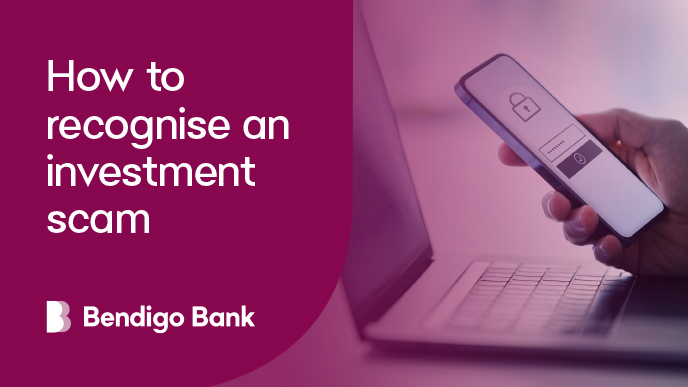What are investment scams?
Investment scams occur when someone contacts you out of nowhere, such as by phone or email, offering you the chance to make easy money through a ‘once in a lifetime opportunity’.
Investment scams can be presented as an offer to make money from potential assets such as:
- cryptocurrencies (e.g. Bitcoin)
- business ventures
- superannuation schemes
- managed funds
- shares or property
- term deposits
- investor bonds
Scammers will often create ‘opportunities’ with professional brochures, websites and advertisements. These can mask fraudulent activities and trick individuals into taking up the offer.
Investment scams can be very convincing. Scammers may look and sound highly professional, and it may be hard to tell if they are genuine investments or not.
How to spot a scam
- If an offer sounds too good to be true, it probably is. Always be wary of ‘investment opportunities’ that promise a high return with little or no risk.
- Most investment fraud scammers engage online via social media advertisements, often endorsed by public figures or well-known TV programs.
- Be suspicious of scammers posing as financial advisors offering to help you access your superannuation early. They’ll try to falsely act on your behalf and trick your super company into paying your benefits into their own account.
- Scammers are likely to ask you to invest more money or make a ‘tax payment’ in order to allow the release of your funds.
- Know that scammers might claim to be calling from genuine investment firms and present you with a legitimate opportunity despite not being an employee of the firm. Once you agree to invest, your funds will not actually go into the investment.
How to protect yourself
- Before putting money into an investment, do some of your own research. You can check if the company has an Australian Financial Services Licence by visiting www.moneysmart.gov.au.
- Watch out for offers promoting the ability to have easy and early access to your superannuation.
- Don’t be pressured into making an investment or decision about your money, especially if you’re presented with an opportunity via an unsolicited email or phone call. Always seek advice from a reputable financial advisor and raise concerns with your local branch.
- Do not give your details to anyone contacting you over the phone or via email offering investment opportunities or financial guidance, especially if you have never met them – hang up or delete the email.
Let us know ASAP if you think you have been the victim of a scam
Things to remember
- Never provide your 6-digit e-banking security code to anyone - in person, over the phone or online even if they claim to work for your bank and have personal information about you.
- Never provide a caller with remote access to your computer.
- We will never ask you for your e-banking PIN, e-banking password or 6-digit e-banking security code.
- We will never ask you to login to e-banking via a link sent in an SMS or sent in an email.
- We may call from time to time and ask to verify your identity by asking for your verbal password. However, we will never ask you for any PIN, password or security code relating to your e-banking. If you feel uncomfortable, you can always verify our branch contact details on our website and call us back.
If you need help or more information
Phone
If you have clicked on any suspicious links and entered your e-banking details:
Call 1300 236 344 (in Australia) or +61 3 5445 0666 (from overseas - standard international call charges apply)
- Monday to Friday - 8am to 9pm AEST/AEDT*
- Weekends and some public holidays - 9am to 8pm AEST/AEDT
*Excludes Christmas Day
SMS
If you have received a suspicious SMS message claiming to be from us, you can forward it to 0429 557 997 for investigation.
Please note you will not receive a personal response from 0429 557 997.
If you have received any suspicious emails, you can forward them to us via email.
Please note you will not receive a personal email response from us.



